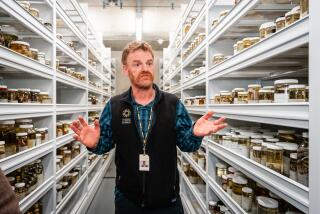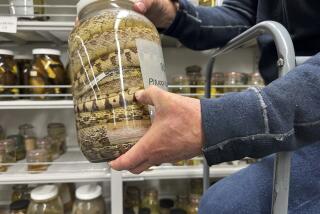He’s Out to Charm With Snake Products : China: Xu Zhiwei’s firm sold $14.6 million worth of accessories, food and cosmetics made from the reptile in ’94. He’s hoping to build a global empire.
- Share via
JIESHAN VILLAGE, China — Do you suffer from acne, itchy skin or pimples? Xu Zhiwei has just the remedy--snake cream. Impotence? No problem. He’s got a powder made from serpents’ genitals.
From his spartan village office in the east China province of Jiangsu, Xu is planning to establish a global empire of medicine and cosmetics made from snakes.
Down the corridor in a smelly room lie thousands of the reptiles in green sacks, still heaving and wriggling. The bodies of others pickle quietly in large glass bottles or lie out to dry in the sun.
“This one is very poisonous,” Xu said with glee as he hoisted a sack whose writhing tenant seemed eager to escape. “It is much in demand; several hundred yuan.” There are 8.3 yuan to the dollar.
Each year, Xu’s Longlife Group turns 200 tons of snakes into handbags, wallets, belts, ties, meat, wine, medicines and cosmetics.
For the group, the 1995 sales target is $16.3 million, $1 million of that in exports. Sales for 1994 were $14.6 million, and exports were $600,000.
By the end of the century, Xu hopes to have $60 million in turnover with $5 million in exports. He expects that as much as 80% of the total will come from sales of snake foods, medicines and cosmetics.
“I see our main growth in Japan, South Korea, Taiwan, Hong Kong and Southeast Asia,” he said over a lunch of snake soup and fried, boiled and smoked snake meat. “Look at Japan, a big snake importer, buying several thousands tons a year.”
To increase sales in these markets, Xu is looking for experienced importers and joint-venture partners who can help manage the pharmaceutical and medical regulations.
Once those are hurdles cleared, Xu thinks consumers overseas will be squirming to buy Longlife products.
Among these is a powder made from snake penises that is said to be a sexual restorative.
“Shanghai consumers are very picky but are buying 3,000 10-box cases of our new snake powder a month,” he said. “If they will buy it, other people will too.”
“The sexual prowess of snakes is well-known. After one mating with the male, a female snake can become pregnant for the next six years,” he added, showing a visitor a dried snake penis ready for pulverizing.
Longlife exports snake powder to Japan, South Korea, Taiwan and Hong Kong. Goods made of snake and other animal leathers go to the United States and Western Europe.
*
The group is composed of 15 companies, four of them joint ventures, has assets of $5.8 million and a work force of 560.
The 1995 target for profits and taxes is $2.4 million; it was $1.33 million in 1994.
The group, a collective of which Xu owns half, has leased 33 acres of land to create a farm and park whose goal is to bring snake production to 600 tons.
Xu wants to make the park, including a snake restaurant, a tourist attraction in hopes of luring visitors away from Suzhou, 25 miles to the south and one of China’s main tourist spots.
Twenty years ago, all of what Xu wants to do with snakes would have been illegal.
During the Cultural Revolution of 1966-76, catching snakes was regarded as “the tail of capitalism” and banned despite its being a tradition of longstanding.
Xu--who was, coincidentally, born in the Year of the Snake in 1953--says he was a prime victim of this hysteria. The son of a rich peasant, he was vilified as a class enemy. He said his father was persecuted by Red Guards.
China’s reform era changed things. Xu entered the Communist Party in 1989 and became village party chief in 1990. He also is village mayor, a real asset to doing business.
“This puts the decision making in the hands of one person, which is efficient,” he said. “Being party secretary helps me get bank loans and solve many other problems. It also improves my credibility.”
Xu has a Mercedes-Benz and chauffeur. He puts his personal 1994 earnings at $12,200. His workers earn an average of $845 a year.
Xu says his new wealth sits lightly on his shoulders.
“I started with nothing. Today I have something. If I lose it all tomorrow, it does not matter.”
More to Read
Sign up for Essential California
The most important California stories and recommendations in your inbox every morning.
You may occasionally receive promotional content from the Los Angeles Times.













